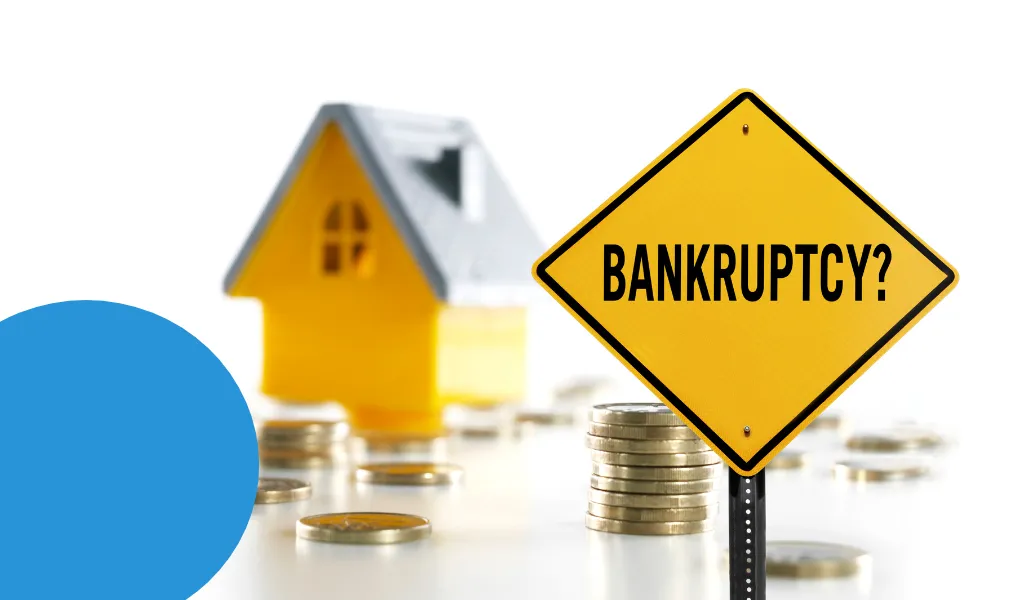Deciding to file for bankruptcy is never an easy conclusion to arrive at. Yet it is a requirement for those who are facing the challenges of debt. It can help people manage their debt and grant them a new financial beginning. Let’s discuss what is bankruptcy and how to file it in the UK.
What is the Definition of Bankruptcy?
Any business or individual that cannot make their monthly repayments on debts, need to file for bankruptcy in the UK.
Essentially, it is an acknowledgment of the formal kind that states you cannot pay your debts. It also clarifies that you need assistance in managing your overwhelming debts.
Furthermore, it allows removal of unsecured debts and relief from creditors. This does not include debts, such as criminal fines and child support. They are not dischargeable by filing for bankruptcy.

What are the Advantages of Bankruptcy?
Let’s look at the pros of applying for bankruptcy in the UK:
1. It Allows Relief from Debt
Bankruptcy provides you with a new start as it eliminates most of your unsecured debts. Therefore, it removes the burden from your shoulder of overwhelming debt.
2. You Receive Protection from Creditors
When you file for bankruptcy, then an automatic stay comes into play. This inhibits creditors from chasing debt collection. They cannot contact you or harass you. Also, they cannot bring a legal action against you for collecting the debt. The law prohibits this from happening.
3. You Can Gain Financial Stability
Once you relieve yourself of high-interest debts, you can start building your credit. This means you can save for the future. Thus, you can achieve financial stability through bankruptcy.
4. It Permits Rebuilding Credit
Unfortunately, you will have bankruptcy in your credit report for seven or even ten years. Nevertheless, you can still improve or rebuild your credit with time. You have an opportunity to start over and have a thriving future.
5. You Can Regain Possession of Assets
Filing for bankruptcy grants you the legal right to reclaim any asset you lost because of the creditor’s actions. This can be anything from car repossession to home foreclosure. Furthermore, if a part of your debt is discharged due to bankruptcy, creditors cannot collect it again.
6. You Benefit from Tax Debt Relief
By applying for bankruptcy, you can eliminate most of your tax debt. This includes some delinquent taxes. If you are struggling with significant tax debt, then it can benefit fit you greatly.
7. It is of Reasonable Cost
Another benefit of bankruptcy is that is not expensive. In fact, in comparison to the monthly payments you made on high-interest debts, it is quite less. Which is a great way to save money over time and start repairing credit as soon as possible. Now, let’s move on to what is bankruptcy and how to file it in the UK.
What is Bankruptcy and How to File it in the UK?
If you are planning to declare yourself bankrupt, then you fill out an online application and create an online account.
Also, you must provide information regarding the following:
- employment/income
- bank accounts
- debts
- assets
- pension
- outgoings
This list includes letters you receive from enforcements agents or bailiffs.
Next, an official adjudicator reviews your application. They work for the Insolvency Service. It is their decision to declare you bankrupt.
In most cases, they arrive at a decision within 28 days of you sending your application for review.

What is the Cost of Bankruptcy?
If you want to apply for bankruptcy, you need to pay £680 before you can submit your application.
In case you cannot afford to pay this fee, you may pay it in instalments.
An important point to remember is that you can reach out a debt adviser. They will help you decide if bankruptcy is the ideal option for you or not.
Steps After Declaration of Bankruptcy
What happens after you go bankrupt? Within two weeks of getting your bankruptcy order, authorities appoint an Official Receiver to you.
Their responsibility is to evaluate the following:
- your income
- any assets
- any outgoings
They will look at all this to see how they can use them to meet your debts. If necessary, you might need to go to an interview with the Official Receiver.
What is the role of the creditors in this process? Their role is to make a formal claim to the trustee. They need to claim the money that you owe them.
It is essential to note that you cannot pay them directly. Also, they cannot ask you to do so.
Usually, it takes one year to write off your outstanding debts. You can then begin to make a fresh start.
Furthermore, you remain under bankruptcy restrictions until they discharge you from it.
An example of such restrictions is that you cannot apply for credit of £500 or more. You must inform the lender about your bankruptcy.
Is Bankruptcy the Right Option for You?
Now that you understand what is bankruptcy and how to file it, let’s talk about suitability.
In the unfortunate case that you have no way to pay off your debts, then perhaps it is suitable.
On the other hand, if you own a home, it is better to consider other options. This is because bankruptcy puts your home at risk of being sold. It can happen if there is enough equity in it.
A landlord can evict a tenant legally if they have rent due for some time.
Therefore, it is best not to decide on bankruptcy by yourself. Consider talking to a debt adviser to find out if bankruptcy is right for you.
What can they do? Well, the following:
- Provide you with ways of dealing with your debts that you did not know about.
- Ensure you avail all the entitlements and benefits available to you.
- Will never judge you or your situation, therefore you can talk freely.
- Do their utmost to make you comfortable with your decision.
- Make sure everything you tell them remains confidential.
What is the Average Number of Denied Bankruptcy Applications in the UK?
In the UK, the percentage of denied bankruptcy applications is low. It is between 1% and 2%.
Reason for denial includes the debtor acting in a fraudulent manner, committing a felony. Also, if declaration of bankruptcy exists within the last six years. It is important to understand what is bankruptcy and how to file it in the UK.
Furthermore, declaration of bankruptcy will not take place if the Official Receiver or adjudicator establish that you have enough disposal income to pay off your debts. Or if you own enough valuable assets that you can sell to pay off said debts.
If you reach out for help from debt advisors, then you can avoid the common mistakes that result in the denial of your bankruptcy application. You can even contact an insolvency practitioner. Therefore, it is important to understand what is bankruptcy and how to file it in the UK.
Which Debts Still Exist After Bankruptcy?
Debts that go away after bankruptcy include personal loans, utility bills, unsecured debts, and credit card debts. On the other hand, debts that remain include criminal fines, fraudulent debts, and even child support payments.
Additionally, any debt you incur after the issuance of the bankruptcy order will not go away. Any debt that is secure against a collateral will also remain. For example, mortgage.
Again, you can get all this information by reaching out to an insolvency practitioner or debt counsellor. This way, you know which debts will remain in your case.
Can You Have a Bank Account If You are Bankrupt?
The short answer is, yes, as a bankrupt, you can have a bank account in the UK.
Plenty of banks allow you to open a basic bank account if you have a poor credit history. This includes bankrupts.
The longer version is that there every bank has its own restrictions and policies. Therefore, according to policy, a bank may not accept you as their customer if you are bankrupt.
What does a standard bank account include? Well, they include a debit card, but no other services. For example, online banking or telephone banking.
Who Pays for Bankruptcies?
You, the debtor, must pay the cost of declaring bankruptcy in the UK. That is why you should know what is bankruptcy and how to file it.
Here are the expenses you must bear:
- £680 fee for the bankruptcy petition.
- £90 for adjudicator’s fee.
Additionally, you may need to pay a lump-sum towards your remaining debts during bankruptcy.
In case you cannot afford to pay the fees, you may qualify for reduction or a fee waiver. In certain situations, the deduction of fees can take place from your estate. Remember, this includes all assets you sell to pay off your outstanding debts.
Conclusion
Before you decide to go bankrupt, it is best to consider your personal situation and seek professional advice. Remember, there are costs involved.
Furthermore, there are alternatives for bankruptcy. Yes, you can avail of less expensive options such as debt relief orders. This is if you find bankruptcy unsuitable for you. Of course, that decision must take place after consulting with a qualified debt advisor or insolvency practitioner. They will guide you towards the best possible option according to your circumstances.


